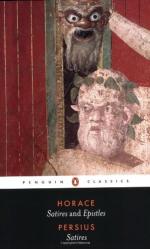|
This section contains 12,783 words (approx. 43 pages at 300 words per page) |

|
SOURCE: Coffey, Michael. “Persius.” In Roman Satire, pp. 98-118. London: Methuen and Co, 1976.
In the following essay, Coffey argues that Persius did not include many autobiographical elements in his satires and that he had no interest in criticizing his contemporaries by name for their shortcomings.
Horace the satirist had no known successor until the time of Nero, the better part of a century later.1 The consolidation of imperial dictatorship by Augustus and his successors ended political liberty and also freedom of speech. Augustus ignored lampoons against himself but had vituperative attacks on other contemporaries burned in public.2 Cassius Severus, a scabrous pamphleteer, was sent into exile.3 In the reign of Tiberius the aged and venerable Cremutius Cordus, a man of blameless life, who in his histories described the horrors of the proscriptions, was accused at the instigation of Sejanus, the emperor's ambitious favourite. Cremutius' speech in his own...
|
This section contains 12,783 words (approx. 43 pages at 300 words per page) |

|


